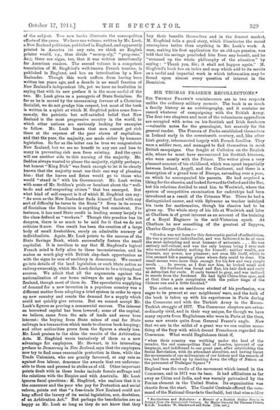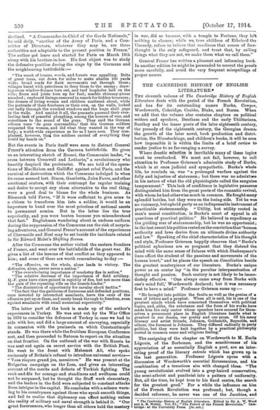SIR THOMAS FRASER'S RECOLLECTIONS.*
Sin THOMAS FRASER'S reminiscences are in two respects unlike the ordinary military memoir. The book is as much a family history as an autobiography, and it contains no record whatever of campaigning with the British Army. The first two chapters and most of the voluminous appendices
are occupied with notes on his Scottish and Irish forebears —valuable notes for the genealogist, but scarcely for the general reader. The Frasers of Parke established themselves in Ireland early in the seventeenth century, and, like other Irish gentry, intermarried largely with French families. They were a soldier race, and managed to find themselves in most British campaigns. One fought at Culloden on the English side, where be must have encountered his Scottish kinsmen, who were mostly with the Prince. The writer gives a very pleasant account of his childhood, which was spent impartially between Ireland, Argyll, and the Continent, and there is a description of a grand tour of Europe, extending over a year, on which he accompanied his parents. He had acquired a liking for the classics, and looked forward to Oxford and the Bar, but his relations decided to send him to Woolwich, where the system of competitive examination for cadetships had been introduced as a result of the Crimean War. There he had a
distinguished career, and with Sylvester as teacher indulged his taste for mathematics, though his classics had to be given up. The whole story of his life at Woolwich and later
at Chatham is of great interest as an account of the training of a Royal Engineer in the mid-Victorian epoch. At Chatham be saw something of the greatest of Sappers, Charles George Gordon :-
" Gordon was not born for this democratic period of collectivism. He was a primeval individualist, and was fashioned to be at once the most unbending and most humane of autocrats. . . . He was entirely self-reliant, and was the only human being I ever met who wanted absolutely nothing for himself : neither wealth, nor honours, nor power, nor pleasure; not even life itself, which to him seemed but a passing phase where duty could be done. His small means were more than enough for his few and very simple needs. . . . In person, as I first saw him, he looked small and spare. His forehead was broad and fine, his hair dark and curly as Astrachan fur curls. It early turned to grey, and was inclined to recede from the forehead. He had light China-blue eyes, and at that time a pale complexion with the yellow tinge of the Chinese sun and a little freckled."
The author, as an assiduous student of his profession, was
eager to be present at our neighbours' wars, and the bulk of the book is taken up with his experiences in Paris during the Commune and with the Turkish Army in the Russo- Turkish struggle of 1877. The Commune chapters are extra- ordinarily vivid, and in their way unique, for though we have many reports from Englishmen who were in Paris at the time, none saw events quite from General Fraser's angle. Now that we are in the midst of a great war we can realize some- thing of the fury with which decent Frenchmen regarded the Commune. What would Englishmen think if,
" when their country was writhing under the heel of the invader, the red cosmopolitan East of London, ignorant of our language, and indifferent to our great past, after establishing the Social Revolution, with its attendant atrocities, and having burnt the monuments of one millennium of our history and the records of two, had then ended up by dashing down the effigy of Nelson on the pavement of Trafalgar Square' P
England was the cradle of the movement which issued in the Commune, and in 1871 was its base. It had affiliations as far away as China and India, and was warmly patronized by the Fenian element in the United States. Its organization was chaotic, from the start. The Comite Centrale offered the com- mand of the National Guards to Garibaldi, but that wise soldier
• Beret/actions and Reflections : a Memoir of a Scottish Soldier Family in Ireland from the Seventeenth Century. By Major-General Six Thomas Fraser, X.C.B. London, W. Blackwood and Bons. [1..%. net.]
declined. " A Commander-in-Chief of the Garde Nationale," he said drily, "another of the Army of Paris, and a Com- mittee of Directors, whatever they may be, are three authorities not adaptable to the present position in France." The author got leave and started for Paris on March 16th along with his brother-in-law. His first object was to study the defensive position during the siege by the Germans and the neighbouring battlefields :—
" The wreck of houses, woods, and forests was appalling. Belts of great trees, cut down for miles to make abattis 100 yards wide; broad roads for flank movements cut through these; villages burnt with petroleum to deny them to the enemy; draw- ing-room window-frames torn out, and turf loopholes laid on the sills; floors and joists torn up for fuel; marble chimney-pieces smashed ; cupboard linings removed in search for hidden treasures ; the dresses of living women and children scattered about, while the portraits of their forebears or their own, on the walls, looked out sadly through the wrecked windows and the huge shell gaps in the walls. And amidst it all, the peasants pursued their ever- lasting task of peaceful ploughing, among the horrors of war, and sometimes to the sound of the guns. They said the German officers were de gene convenables,' that the German soldiers respected the women, and did what they wanted in the way of help; a world-wide experience as far as I have seen. They com- plained, however, that the soldiers carried off everything they could lay hands on."
But the events in Paris itself were soon to distract General Fraser's attention from the German battlefields. He gives us an interesting sketch of Rossel, the Communist leader, "a cross between Cromwell and Lothario," a revolutionary who heartily despised the proletariat. We are told of the opera- tions of MacMahon and Galliffet against rebel Paris, and the carnival of destruction which the Commune indulged in when its cause seemed lost. Simon, Gambetta, Jules Favre, and other emotional orators, with their contempt for regular training and desire to accept any sham alternative to the real thing, were a good deal to blame for the whole business. As Bismarck told Favre, "If it were sufficient to give arms to a citizen to transform him into a soldier, it would be an imposture to hand over the most priceless of national assets to permanent armies. But in the latter lies the true superiority, and you were beaten because you misunderstood that fact." Englishmen wandering about in undress uniform during the suppression of the Commune ran the risk of surpris-
ing adventures, and General Fraser's account of the experiences of Chermside and Noel may be set beside the incidents related in Sir Edward Malet's Shifting Scenes.
After the Commune the author visited the eastern frontiers of France, and went over the battlefields of the great war. He gives a list of the lessons of that conflict as they appeared to him; and some of these are worth remembering to-day :—
"The offensive, on the whole, alone leads to victory. The defensive, alone, never saves a nation."
"The overwhelming importance of musketry fire in action."
"The relative decrease of the importance of field artillery. Q.-F. guns have since gained in rapidity of fire, but not more than the gain of the repeating rifle on the breech-loader."
"The diminution of opportunity for cavalry shock tactics."
"The fact that the garrisons of fortresses and defended positions, once invested by intrenched assailants, have the onus of the offensive put upon them, and rarely break through to freedom, even against assailants with small numerical superiority."
The latter part of the book is made up of the author's experiences in Turkey. He was sent out by the War Office
in 1876 to consider the defences of Turkey in case we had to side with her, and did a large amount of surveying, especially in connexion with the peninsula on which Constantinople stands. He was there while the fruitless European Conference met, and then proceeded to Batoum to report on the situation on that frontier. On the outbreak of the war with Russia he was sent out again on secret service with the British Fleet. He went to the front with Mehemet Ali, who spoke ominously of Britain's refusal to introduce universal service- " Irons risquez grand jen, messieurs." He was present at the Bulgarian campaign on the Lom, and gives an interesting account of the merits and defects of Turkish fighting. The rank-and-file for courage and steadiness and swiftness could not be surpassed, but he thought the Staff work elementary, and the leaders in the field were subjected to constant attacks from intrigue in the capital. He concludes with a solemn warn- ing to his countrymen against those who speak smooth things, and fail to realize that diplomacy can effect nothing unless the reality of military and naval strength is behind it. "Our great forerunners, who longer than all others held the mastery in war, did so because, with a temple to Fortune, they left nothing to chance; while we, true children of Ethelred the Unready, refuse to believe that readiness that comes of fore. thought is the only safeguard, and trust that, by calling things what they are not, we make them what we call them."
General Fraser has written a pleasant and informing book. In another edition he might be persuaded to correct the proofs more carefully, and avoid the very frequent misspellings of proper names.



































 Previous page
Previous page